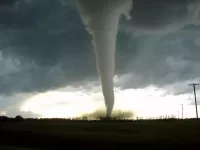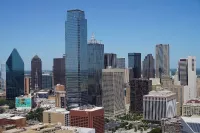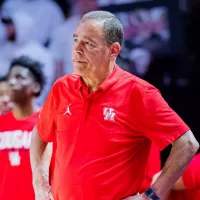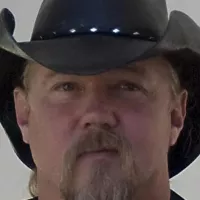1900: Land Ownership in Oklahoma
By 1900, as a result of the Dawes Act and the Curtis Act, approximately one-half of land previously owned by Indian tribes was owned by whites.
1901: Wichita Mountains Wildlife Refuge Founded
In 1901, the Wichita Mountains Wildlife Refuge, the oldest and largest of nine National Wildlife Refuges in the state, was founded.
1905: Jurisdiction Handed to Arkansas
After petitioning congress to hand over jurisdiction, the 57 acres was given to Arkansas in 1905.
1905: Sequoyah Statehood Convention
In 1905, the Sequoyah Statehood Convention laid the groundwork for the Oklahoma Statehood Convention, which took place two years later.
June 16, 1906: Congressional Statute for Oklahoma Statehood
On June 16, 1906, Congress enacted a statute authorizing the people of the Oklahoma and Indian Territories (as well what would become the states of Arizona and New Mexico) to form a constitution and state government in order to be admitted as a state.
November 16, 1907: Oklahoma Statehood
On November 16, 1907, President Theodore Roosevelt issued Presidential Proclamation no. 780, establishing Oklahoma as the 46th state in the Union.
1907: Oklahoma Panhandle Acquisition
In 1907, upon gaining statehood, Oklahoma acquired the territory of the Oklahoma panhandle.
November 11, 1911: Oklahoma City Temperature Extremes
On November 11, 1911, the temperature in Oklahoma City reached a high of 83 °F (28 °C) and then dropped to a low of 17 °F (−8 °C) by midnight due to a cold front.
1912: Oklahoma Tornado Outbreak
In 1912, Oklahoma experienced a tornado outbreak with an average of about one tornado per hour.
1915: Revival of the Ku Klux Klan
After 1915, social tensions were exacerbated by the revival of the Ku Klux Klan.
September 1918: Spanish Flu in Oklahoma
In late September 1918, the first cases of the Spanish flu appeared in Oklahoma, overwhelming health workers and local governing bodies.
1919: Decline of Spanish Flu in Oklahoma
By 1919, the Spanish flu pandemic ebbed in Oklahoma, after an estimated 100,000 people fell ill, and around 7,500 proved fatal.
1920: Republican Presidential Elections in 1920
During the first half-century of statehood, Oklahoma was carried by the Republican Party in the 1920 presidential election.
1920: Oklahoma Population in 1920
In 1920, the U.S. census population of Oklahoma was 2,028,283.
1921: Tulsa Race Massacre
In 1921, the Tulsa race massacre broke out, with White mobs attacking Black people and carrying out a pogrom in Greenwood.
1927: Creation of U.S. Route 66
In 1927, Oklahoman businessman Cyrus Avery began the campaign to create U.S. Route 66, using a stretch of highway from Amarillo, Texas to Tulsa, Oklahoma as part of the original highway and also spearheading the creation of the U.S. Highway 66 Association to oversee the planning of Route 66, based in his hometown of Tulsa.
1928: Republican Presidential Elections in 1928
During the first half-century of statehood, Oklahoma was carried by the Republican Party in the 1928 presidential election.
1934: Severe Drought in Oklahoma
In 1934, Oklahoma experienced a summer of severe drought with weeks of virtual rainlessness and highs well over 100 °F (38 °C).
1939: Publication of The Grapes of Wrath
In 1939, John Steinbeck's novel "The Grapes of Wrath" was published, popularizing the negative cultural stereotype of "Okies".
1940: Population Demographics in 1940
In 1940, Oklahoma's population was predominantly non-Hispanic White, comprising 90.1% of the state's residents.
1948: Republican Party Shift After 1948
After the 1948 election, Oklahoma turned firmly Republican.
1949: Broadcast Television Begins in 1949
Broadcast television in Oklahoma began in 1949 with the launch of KFOR-TV (then WKY-TV) in Oklahoma City and KOTV-TV in Tulsa.
1950: Oklahoma Population Decline Ends
Over a twenty-year period ending in 1950, the state saw its only historical decline in population, dropping 6.9 percent as impoverished families migrated out of the state after the Dust Bowl.
1952: Republican Presidential Candidates Since 1952
Since 1952, Oklahoma has been carried by Republican presidential candidates in all but one election.
1953: CBS Omnibus television broadcast featuring Oklahoma! cast
In 1953, Ridge Bond and the cast of Oklahoma! were featured on a CBS Omnibus television broadcast.
1954: Severe Drought in Oklahoma
In 1954, Oklahoma experienced a summer of severe drought with weeks of virtual rainlessness and highs well over 100 °F (38 °C).
1962: University of Oklahoma's dance program founded
In 1962, ballerina Yvonne Chouteau and her husband Miguel Terekhov founded the University of Oklahoma's dance program, which was the first fully accredited program of its kind in the United States.
1964: Lyndon B. Johnson's Victory in 1964
Oklahoma was carried by Lyndon B. Johnson in his 1964 landslide victory.
1973: Proposed Nuclear Plant in 1973
In 1973, the Public Service Company of Oklahoma proposed the Black Fox Nuclear Power Plant near Inola, Oklahoma.
1976: Capital Punishment Since 1976
Oklahoma has had capital punishment as a legal sentence since 1976.
1976: Medieval Fair of Norman established
The Medieval Fair of Norman has been held annually since 1976, which was Oklahoma's first medieval fair.
1979: Protests Against Nuclear Plant in 1979
In 1979, protestors disrupted construction of the Black Fox Nuclear Power Plant, several months after the Three Mile Island accident.
1980: Energy Industry Collapse in the 1980s
During the 1980s, a collapse in Oklahoma's energy industry led to the loss of nearly 90,000 energy-related jobs.
1980: Life Expectancy Increase from 1980-2014
From 1980 to 2014, male life expectancy in Oklahoma increased by 4.0 years, while the national average increased by 6.7 years. Female life expectancy in Oklahoma increased by 1.0 years, while the national average increased by 4.0 years during the same period.
1980: Severe Drought in Oklahoma
In 1980, Oklahoma experienced a summer of severe drought with weeks of virtual rainlessness and highs well over 100 °F (38 °C).
1980: TBN Affiliate in 1980
In 1980, TBN, a Christian television network, built its first entirely TBN-owned affiliate in Oklahoma City.
1982: Nuclear Plant Project Cancelled in 1982
In 1982, the Black Fox Nuclear Power Plant project was cancelled after nine years of legal challenges.
1985: US Supreme Court Case Oklahoma v. Arkansas
In 1985 the US Supreme Court Case Oklahoma v. Arkansas decided the land would remain Arkansas, even though the Choctaw had not been notified or asked about the territory being handed over.
1987: Oklahoma City Pride Parade established
The Oklahoma City Pride Parade has been held annually in late June since 1987 in the gay district of Oklahoma City on 39th and Penn.
1990: English Spoken at Home in 1990
In 1990, 95% of Oklahomans spoke only English at home.
1990: White Population in 1990
In 1990, the White population of Oklahoma was 81%.
1992: Education Expenditures Between 1992-2002
The growth of total education expenditures between 1992 and 2002 ranked 22nd.
April 19, 1995: Oklahoma City Bombing
On April 19, 1995, Oklahoma City was the site of the Oklahoma City bombing, in which Timothy McVeigh detonated a large, crude explosive device outside the Alfred P. Murrah Federal Building, killing 168 people, including 19 children.
2000: Population Growth in Oklahoma Cities
Between 2000 and 2010, the leading cities in population growth were Blanchard (172.4%), Elgin (78.2%), Jenks (77.0%), Piedmont (56.7%), Bixby (56.6%), and Owasso (56.3%).
2000: Energy Industry Collapse Jobs Loss by 2000
By 2000, nearly 90,000 energy-related jobs were lost in Oklahoma due to the energy industry collapse that started during the 1980s.
2000: Reduced Congressional Delegation After 2000 Census
Following the 2000 census, the Oklahoma delegation to the U.S. House of Representatives was reduced from six to five representatives.
2000: Language Spoken at Home in 2000
In 2000, 92.6% of Oklahomans spoke only English at home, while 7.4% spoke another language.
2000: Religious Demographics in 2000
In 2000, Oklahoma had approximately 5,000 Jews and 6,000 Muslims, with ten congregations for each group.
2000: Oklahoma physician statistics
In 2000, Oklahoma ranked 45th in physicians per capita but was slightly above the national average in hospital beds per 100,000 people.
2000: Second Most Spoken Language in 2000
In 2000, Spanish was the second-most commonly spoken language in Oklahoma, with 141,060 speakers.
June 11, 2001: Execution of Timothy McVeigh
On June 11, 2001, Timothy McVeigh was executed by the federal government for his crime in the Oklahoma City bombing.
2001: U.S. Open at Southern Hills Country Club
In 2001, Southern Hills Country Club in Tulsa hosted one of its three U.S. Open tournaments.
2002: Education Expenditures Between 1992-2002
The growth of total education expenditures between 1992 and 2002 ranked 22nd.
2003: OG&E's Wind Farm Electricity Generation in 2003
In 2003, Oklahoma Gas & Electric (OG&E) was the first electric company in Oklahoma to generate electricity from wind farms.
2003: Medieval Fair of Norman moved
In 2003, the Medieval Fair of Norman moved to Reaves Park due to its increasing size.
2004: Data for Catalogue of Philanthropy
Data from 2004 was used to determine Oklahomans' rank in generosity for the 2006 Catalogue of Philanthropy.
2004: Republican Candidate Wins Every County Since 2004
Every single county in Oklahoma has been won by the Republican candidate in each election since 2004.
2004: Pre-Kindergarten Education in 2004
In 2004, Oklahoma was rated first in the United States for pre-kindergarten education.
2005: Oklahoma ranked 21st in medical funding
In 2005, Oklahoma was the 21st-largest recipient of medical funding from the federal government, with health-related federal expenditures in the state totaling $75,801,364. Immunizations, bioterrorism preparedness, and health education were the top three most funded medical items.
2005: International Exports in 2005
In 2005, international exports from Oklahoma's manufacturing industry totaled $4.3 billion, accounting for 3.6 percent of its economic impact.
2005: Uninsured Oklahomans
In 2005, nearly 25 percent of Oklahomans between the ages of 18 and 64 did not have health insurance, the fifth-highest rate in the nation.
2005: Cherokee Nation ten-year plan
In 2005, the Cherokee Nation initiated a ten-year plan focused on growing new speakers of the Cherokee language, with the goal of having 80% of the population fluent in fifty years. The Cherokee Preservation Foundation invested $3 million in this effort.
2005: Ancestral Makeup in 2005
In 2005, the ancestral makeup of Oklahoma included German (14.5%), American (13.1%), Irish (11.8%), English (9.6%), African American (8.1%), and Native American (11.4%, including 7.9% Cherokee).
2005: Percentage of Oklahoma residents born outside the United States
In 2011, data from 2005 to 2009 indicated about 5% of Oklahoma's residents were born outside the United States.
2006: Tulsa's Oktoberfest named top 10 in the world
In 2006, Tulsa's Oktoberfest was named one of the top 10 in the world by USA Today.
2006: Newspapers in Oklahoma in 2006
In 2006, there were more than 220 newspapers in Oklahoma, including 177 weekly and 48 daily publications.
2006: Oklahomans ranked 7th in the nation for generosity
The 2006 Catalogue for Philanthropy (with data from 2004) ranked Oklahomans 7th in the nation for overall generosity.
July 1, 2007: Start of completions component for degree holders
July 1, 2007 marked the beginning of the completions component for degree holders in Oklahoma, which ran until June 30, 2008.
November 16, 2007: 100th anniversary of statehood
November 16, 2007, marked the 100th anniversary of Oklahoma's statehood, celebrated with multiple events. The American Bus Association named Oklahoma's centennial celebration the top event in the United States for 2007.
2007: High School Dropout Rate in 2007
Between 2007 and 2008, Oklahoma's high school dropout rate decreased from 3.1 to 2.5 percent.
2007: Oklahoma's Business-Friendly Rating in 2007
In 2007, Oklahoma was rated one of the most business-friendly states in the nation, with the 7th-lowest tax burden.
2007: Tulsa's Mayfest
In 2007, Tulsa's Mayfest festival entertained more than 375,000 people in four days.
2007: Oil in Oklahoma's Economy in 2007
In 2007, oil accounted for $35 billion in Oklahoma's economy.
2007: Princeton Review's list of best regional colleges
In 2007, six of Oklahoma's universities were recognized in the Princeton Review's list of the best 122 regional colleges, and three of those made the list of top colleges for best value.
2007: Heartland Flyer Connection to Tulsa in 2007
In early 2007, lawmakers began seeking funding to connect the Heartland Flyer to Tulsa, but nothing came of it.
2007: Oklahoma health care performance ranking
Oklahoma ranked last among the 50 states in a 2007 study by the Commonwealth Fund on health care performance.
June 30, 2008: End of completions component for degree holders
June 30, 2008 marked the end of the completions component for degree holders in Oklahoma, which began on July 1, 2007.
2008: Religious Adherents in 2008
According to the Pew Research Center in 2008, around 80% of Oklahoma's religious adherents were Christian.
2008: Students Enrolled in 2008
As of 2008, Oklahoma had 638,817 students enrolled in public schools and spent $7,755 per student.
2008: High School Dropout Rate in 2008
Between 2007 and 2008, Oklahoma's high school dropout rate decreased from 3.1 to 2.5 percent.
2008: Busiest Highway in 2008
In 2008, Interstate 44 in Oklahoma City was Oklahoma's busiest highway, with a daily traffic volume of 123,300 cars.
2008: Obama Failed to Carry Any Counties in 2008
Oklahoma was the only state where Barack Obama failed to carry any counties in the 2008 election.
2009: Energy Consumption and Costs in 2009
In 2009, Oklahoma ranked 13th for total energy consumption per capita, and its energy costs were eighth-lowest in the nation.
2009: Renewable Energy Usage in 2009
In 2009, Oklahoma was at the bottom of states in usage of renewable energy, with 94% of its electricity being generated by non-renewable sources.
2009: Failure to Protect Law in 2009
In 2009, Oklahoma's "Failure to Protect" law went into effect, leading to the imprisonment of 139 women solely for failure-to-protect charges.
2009: Oil Industry Contribution in 2009
In 2009, the oil energy industry contributed $35 billion to Oklahoma's gross domestic product (GDP).
2009: Percentage of Oklahoma residents born outside the United States
In 2011, data from 2005 to 2009 indicated about 5% of Oklahoma's residents were born outside the United States.
2009: Native American Students in 2009
In the 2009–10 school year, Oklahoma had the highest enrollment of Native American students in the nation with 126,078 students.
2010: Oklahoma Population in 2010
At the 2010 census, Oklahoma's population was 3,751,675.
2010: Oklahomans living with undocumented family member
Between 2010 and 2014, 125,989 Oklahomans having lived with at least one undocumented family member.
2010: Tulsa Shock relocation
From 2010 the Tulsa Shock of the Women's National Basketball Association (WNBA) played in Oklahoma
2010: Forbes List of Largest Private Companies in 2010
In 2010, Love's Travel Stops & Country Stores ranked 18th, QuikTrip ranked 37th, and Hobby Lobby ranked 198th on the Forbes list of largest private companies.
2010: Incorporated Places in Oklahoma
In 2010, Oklahoma had 598 incorporated places, including four cities over 100,000 in population and 43 over 10,000.
2010: Structurally Deficient Bridges in 2010
In 2010, Oklahoma had the nation's third-highest number of bridges classified as structurally deficient, with nearly 5,212 bridges in disrepair.
2010: Oklahoma's football program ranked 12th in attendance
In 2010, Oklahoma's football program ranked 12th in attendance among American colleges, with an average of 84,738 people attending its home games.
2010: Largest Cities in Oklahoma
In 2010, Oklahoma's largest cities in descending order of population were: Oklahoma City (579,999), Tulsa (391,906), Norman (110,925), Broken Arrow (98,850), Lawton (96,867), Edmond (81,405), Moore (55,081), Midwest City (54,371), Enid (49,379), and Stillwater (45,688).
2010: Airport Passengers Count in 2010
In 2010, Will Rogers World Airport in Oklahoma City averaged a yearly passenger count of more than 3.5 million, and Tulsa International Airport served more than 1.3 million boardings.
2010: Center of Population in Oklahoma
In 2010, the center of population of Oklahoma was in Lincoln County near the town of Sparks.
2010: Largest Church Memberships in 2010
In 2010, the largest church memberships in Oklahoma were in the Southern Baptist Convention, the United Methodist Church, the Roman Catholic Church, the Assemblies of God, and the Church of Jesus Christ of Latter-day Saints (LDS Church).
2010: English Declared Official Language in 2010
Since 2010, the English language has been official in the state of Oklahoma.
2011: Execution Rate Through Mid-2011
Between 1976 and mid-2011, Oklahoma had the highest per capita execution rate in the nation.
2011: Minority Population Under Age 1 in 2011
In 2011, 47.3% of Oklahoma's population younger than age 1 were minorities, meaning they had at least one parent who was not non-Hispanic white.
2011: Severe Drought in Oklahoma
In 2011, Oklahoma experienced a summer of severe drought with weeks of virtual rainlessness and highs well over 100 °F (38 °C).
2011: Wind Energy Capacity in 2011
In 2011, Oklahoma was ranked eighth for installed wind energy capacity.
2011: Percentage of Oklahoma residents born outside the United States
In 2011, data from 2005 to 2009 indicated about 5% of Oklahoma's residents were born outside the United States.
2011: Labor Force and Employment in 2011
In mid-2011, Oklahoma had a civilian labor force of 1.7 million, with non-farm employment around 1.5 million. The government sector provided the most jobs.
2012: Agricultural Production in 2012
In 2012, Oklahoma had 85,500 farms producing $4.3 billion in animal products and fewer than one billion dollars in crop output.
2012: State Motto Change Attempt in 2012
In 2012, the House passed HCR 1024, which would change the state motto from "Labor Omnia Vincit" to "Oklahoma—In God We Trust!"
2013: All-Republican Congressional Delegation from 2013-2019
Oklahoma had an all-Republican congressional delegation from 2013 to 2019.
2014: Religious Adherents in 2014
According to the Pew Research Center in 2014, 79% of Oklahoma's religious adherents were Christian. The largest growth since 2008 was in the number of people who identify as religiously unaffiliated.
2014: Oklahomans living with undocumented family member
Between 2010 and 2014, 125,989 Oklahomans having lived with at least one undocumented family member.
2014: Oklahoma City Blue Relocated
In 2014, the Oklahoma City Blue of the NBA G League relocated to Oklahoma City from Tulsa, where they were formerly known as the Tulsa 66ers.
2014: Oklahoma Life Expectancy in 2014
In 2014, the average life expectancy for males in Oklahoma was 73.7 years, while the national average was 76.7 years. For females in Oklahoma, the average was 78.5 years, compared to the national average of 81.5 years.
2015: Registered Republicans Minority Until 2015
Although registered Republicans were a minority in the state until 2015, Oklahoma has been carried by Republican presidential candidates in all but one election since 1952.
2015: Tulsa Shock relocation
In 2015, the Tulsa Shock of the Women's National Basketball Association relocated to Dallas–Fort Worth, becoming the Dallas Wings.
May 31, 2016: Record Setting Flooding
On May 31, 2016, several cities in Oklahoma experienced record setting flooding.
2016: Oklahoma teacher pay ranking
According to the National Education Association, teachers in Oklahoma had ranked 49th out of the 50 states in terms of teacher pay in 2016.
2016: Trump Wins Oklahoma City in 2016
Oklahoma City was the largest city in the United States carried by Republican Donald Trump in the 2016 election.
April 2, 2018: Oklahoma Teachers' Strike Begins
On April 2, 2018, tens of thousands of K–12 public school teachers in Oklahoma began a strike due to a lack of funding for education, despite a recent legislative measure to raise teacher salaries by $6,100, teachers sought a $10,000 raise and more funding for education.
June 26, 2018: Oklahoma legalizes medical marijuana
On June 26, 2018, Oklahoma legalized marijuana for medical purposes, becoming one of the most conservative states to approve medical marijuana.
2018: Immigrant Population in Oklahoma
According to a study in 2018, approximately 236,882 immigrants resided in Oklahoma, making up 6% of the state's population.
2018: Incarceration Rate in 2018
In 2018, Oklahoma had an incarceration rate of 1,079 per 100,000 residents, higher than any country in the world, earning it the description of "the world's prison capital".
2019: Electricity Production Sources in 2019
In 2019, 53.5% of Oklahoma's electricity was produced from natural gas and 34.6% from wind power.
2019: Survey on Oklahoma teacher pay
In 2019, a survey found that the pay raise obtained by the strike lifted the State's teacher pay ranking to 34th in the nation.
2019: All-Republican Congressional Delegation from 2013-2019
Oklahoma had an all-Republican congressional delegation until 2019.
May 2020: Anti-Red Flag Law Enacted in May 2020
In May 2020, Oklahoma became the first state to enact an anti-red flag law, prohibiting the acceptance of any grants or funding to enact red flag laws.
July 9, 2020: McGirt v. Oklahoma Supreme Court Decision
On July 9, 2020, the Supreme Court of the United States determined in McGirt v. Oklahoma that the reservations of the Five Tribes, comprising much of Eastern Oklahoma, were never disestablished by Congress and thus are still "Indian Country" for the purposes of criminal law.
September 2020: Unemployment Rate in September 2020
As of September 2020, Oklahoma's unemployment rate was 5.3%.
2020: Religious Demographics in 2020
According to the 2020 Public Religion Research Institute's survey, 73% of Oklahoma's population were Christian, with Evangelicalism making up 29%. About 22% of the population had no religious affiliation.
2020: Native American Voter Split in 2020
As of the 2020 election, Native American voters, 16% of the state's population, are split, with urban populations supporting the Democrats and rural reservation populaces favoring the Republicans.
2020: ESPN calls Oklahoma City "the center of the softball universe"
In 2020, ESPN called Oklahoma City "the center of the softball universe", referring to the fast-pitch version of the sport.
2020: Oklahoma City Metropolitan Area Population
In 2020, Oklahoma City had the largest metropolitan area in the state, with 1,425,695 people.
2020: Oklahoma American Indian Population
In 2020, according to the U.S. census, 14.2 percent of Oklahomans identify as American Indians, which is the highest indigenous population by percentage in any state.
2020: Trump Wins Oklahoma City in 2020
Oklahoma City was the largest city in the United States carried by Republican Donald Trump in the 2020 election.
2020: Covid Pandemic Impact Start in 2020
Oklahoma was impacted by the Covid pandemic beginning in 2020.
2020: Oklahoma Population in 2020
The 2020 census revealed Oklahoma's population to be 3,959,353, an 5.5% increase since 2010.
March 2021: Nuclear Power Plants in March 2021
As of March 2021, Oklahoma had no operational nuclear power plants.
2021: All-Republican Congressional Delegation in 2021
Oklahoma has had an all-Republican congressional delegation since 2021.
December 22, 2022: Covid Impact in Oklahoma as of December 22, 2022
As of December 22, 2022, Oklahoma had been more impacted by the Covid pandemic than the average U.S. state, with 405 deaths per 100,000 population and 59 percent fully vaccinated, compared to the U.S. averages of 331 deaths per 100,000 and 68 percent fully vaccinated.
2022: Oklahoma Population Surpasses 4 Million
A 2022 American Community Survey estimate found that Oklahoma's population had surpassed 4 million residents for the first time.
2022: Homeless Population in Oklahoma
According to HUD's 2022 Annual Homeless Assessment Report, there were an estimated 3,754 homeless people in Oklahoma.
2022: PGA Championship at Southern Hills Country Club
In 2022, Southern Hills Country Club in Tulsa hosted one of its five PGA Championships.
April 2023: Sentencing Project Report in April 2023
In April 2023, a report by The Sentencing Project highlighted Oklahoma's Failure to Protect law, which has been used primarily against women, sometimes resulting in survivors of abuse facing longer sentences.
June 2023: Heartland Flyer Extension Plans in June 2023
In June 2023, Oklahoma and Kansas state officials began seeking federal approval and funding to extend the Heartland Flyer from Oklahoma City to Newton, Kansas.
November 2023: Heartland Flyer Service Start Date in November 2023
In November 2023, KDOT said the Heartland Flyer service extension would start in 2029 if approved, but could begin sooner if fast-tracked.
2023: Oklahoma's GDP and Per Capita Income in 2023
In 2023, Oklahoma's gross domestic product was $254.13 billion, and its per capita income was $58,499, which ranked 43rd in the U.S.
2023: Covid Pandemic Impact End in 2023
Oklahoma was impacted by the Covid pandemic until 2023.
2024: Oklahoma Dams
As of 2024, Oklahoma had more than 4,700 dams, about 20% of all dams in the U.S.
2024: Teqball competition in Tulsa
From June 14–16, 2024, a teqball competition was held in Tulsa.
April 2025: Resolution Proclaiming Christ the King in April 2025
In April 2025, the Oklahoma Legislature passed a non-binding concurrent resolution proclaiming Christ the King and recognize "the enduring influence of Christian faith in the lives of its people."
2028: Softball at the Summer Olympics
In 2028, Devon Park in Oklahoma City will host softball at the Summer Olympics, and the Riversport OKC complex will host canoe slalom.
2029: Projected Start for Heartland Flyer Extension in 2029
KDOT projected the Heartland Flyer service extension would start in 2029 if approved, or possibly sooner if fast-tracked.
Mentioned in this timeline

Basketball is a team sport played on a rectangular court...
CBS Broadcasting Inc CBS is a prominent American commercial broadcast...

Timothy James McVeigh was a domestic terrorist from the United...

Football is a family of team sports primarily involving kicking...

A tornado is a rotating column of air connecting the...

Dallas is a major city in Texas United States and...
Trending

37 minutes ago Kelvin Sampson's Coaching Philosophy and Houston Cougars' SLAM Magazine Cover

37 minutes ago Trace Adkins Hints at Retirement with 2026 Tour Potentially Being His Last

38 minutes ago Urgent search: 3-year-old girl missing in Avondale, Amber Alert issued for safe return.

38 minutes ago Jackie Chan Shines in 'Unexpected Family' and Berlin Film Festival Recognition
38 minutes ago DAZN and Matchroom Boxing Extend Media Rights Deal for Five Years

39 minutes ago Russell Westbrook's wife receives death threats amid sports betting accusations and fan anger.
Popular

Jesse Jackson is an American civil rights activist politician and...

Barack Obama the th U S President - was the...

Ken Paxton is an American politician and lawyer serving as...
Randall Adam Fine is an American politician a Republican who...

Bernie Sanders is a prominent American politician currently serving as...

Michael Joseph Jackson the King of Pop was a highly...
